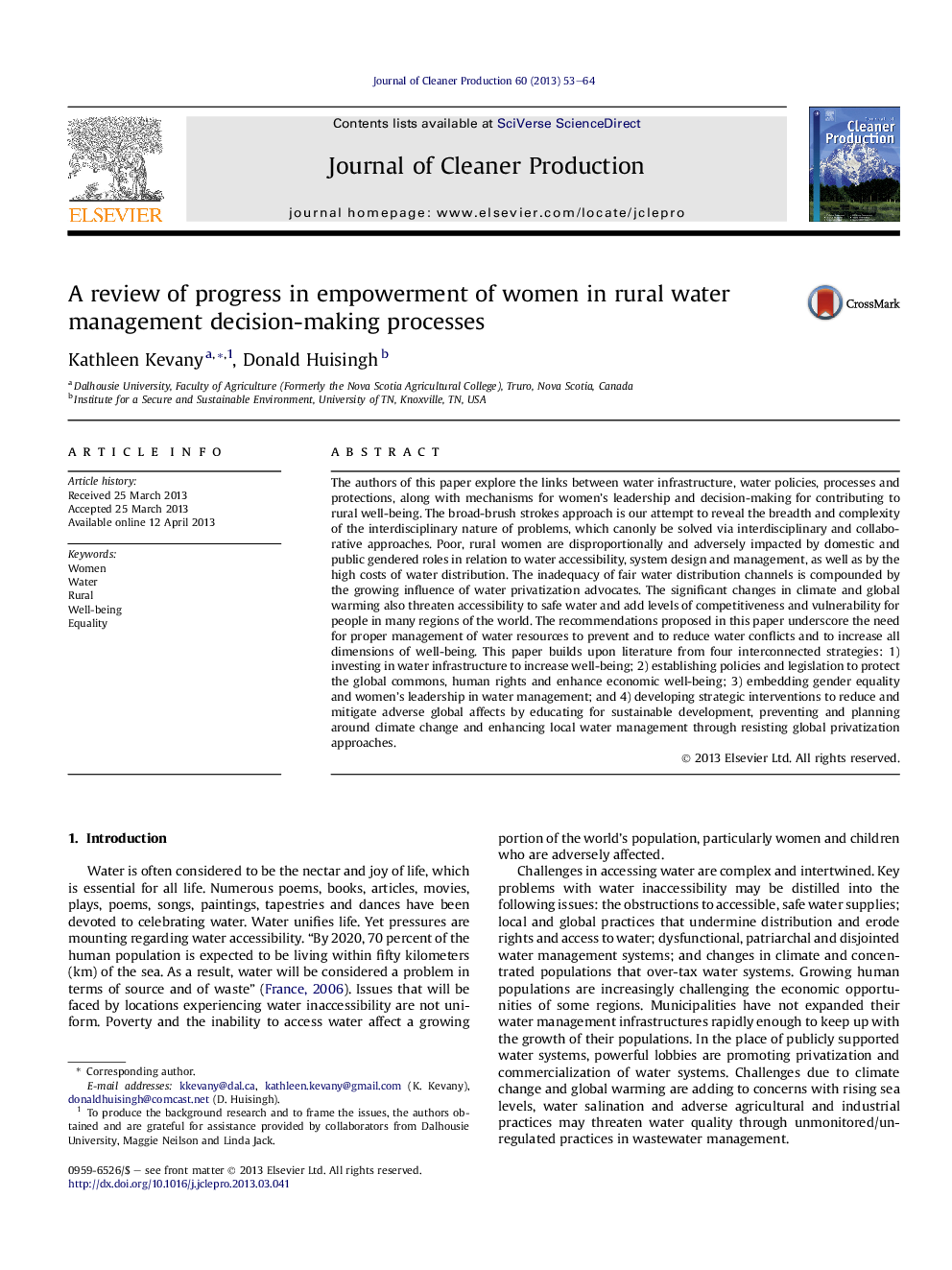| کد مقاله | کد نشریه | سال انتشار | مقاله انگلیسی | نسخه تمام متن |
|---|---|---|---|---|
| 8107163 | 1522186 | 2013 | 12 صفحه PDF | دانلود رایگان |
عنوان انگلیسی مقاله ISI
A review of progress in empowerment of women in rural water management decision-making processes
ترجمه فارسی عنوان
بررسی پیشرفت در توانمند سازی زنان در فرآیندهای تصمیم گیری مدیریت آب روستایی
دانلود مقاله + سفارش ترجمه
دانلود مقاله ISI انگلیسی
رایگان برای ایرانیان
کلمات کلیدی
زنان، اب، روستایی، تندرستی، برابری،
ترجمه چکیده
نویسندگان این مقاله ارتباط بین زیرساخت های آب، سیاست های آب، فرآیندها و حمایت ها را، همراه با مکانیزم برای رهبری زنان و تصمیم گیری برای کمک به رفاه روستایی، بررسی می کنند. رویکرد سکته مغزی گسترده ما تلاش ما برای نشان دادن وسعت و پیچیدگی ماهیت بین رشته ای مشکلات است که می تواند تنها با رویکردهای میان رشته ای و همکاری حل شود. زنان ضعیف و روستایی، از لحاظ دسترسی به آب، طراحی و مدیریت سیستم، و همچنین هزینه های بالای توزیع آب، از نظر نقش جنسیتی داخلی و عمومی ناکارآمد و ناکارآمد هستند. ناکافی بودن کانال های توزیع آب عادلانه به وسیله نفوذ روزافزون طرفداران خصوصی سازی آب افزوده می شود. تغییرات مهمی در آب و هوا و گرم شدن کره زمین نیز باعث دسترسی به آب آشامیدنی و افزایش سطح رقابت و آسیب پذیری برای مردم در بسیاری از مناطق جهان می شود. توصیه هایی که در این مقاله ارائه شده، نیاز به مدیریت مناسب منابع آب را برای جلوگیری و کاهش اختلافات آب و افزایش همه ابعاد رفاه را نشان می دهد. این مقاله بر مبنای ادبیات از چهار راهبرد مرتبط است: 1) سرمایه گذاری در زیرساخت های آب برای افزایش رفاه؛ 2) ایجاد سیاست ها و قوانین برای محافظت از مشترکین جهانی، حقوق بشر و افزایش رفاه اقتصادی؛ 3) تضمین برابری جنسیتی و رهبری زنان در مدیریت آب؛ و 4) توسعه مداخلات استراتژیک برای کاهش و کاهش تاثیرات ناخوشایند جهانی با آموزش برای توسعه پایدار، پیشگیری و برنامه ریزی در برابر تغییرات آب و هوایی و افزایش مدیریت آب محلی از طریق مقاومت در برابر روش های خصوصی سازی جهانی.
موضوعات مرتبط
مهندسی و علوم پایه
مهندسی انرژی
انرژی های تجدید پذیر، توسعه پایدار و محیط زیست
چکیده انگلیسی
The authors of this paper explore the links between water infrastructure, water policies, processes and protections, along with mechanisms for women's leadership and decision-making for contributing to rural well-being. The broad-brush strokes approach is our attempt to reveal the breadth and complexity of the interdisciplinary nature of problems, which canonly be solved via interdisciplinary and collaborative approaches. Poor, rural women are disproportionally and adversely impacted by domestic and public gendered roles in relation to water accessibility, system design and management, as well as by the high costs of water distribution. The inadequacy of fair water distribution channels is compounded by the growing influence of water privatization advocates. The significant changes in climate and global warming also threaten accessibility to safe water and add levels of competitiveness and vulnerability for people in many regions of the world. The recommendations proposed in this paper underscore the need for proper management of water resources to prevent and to reduce water conflicts and to increase all dimensions of well-being. This paper builds upon literature from four interconnected strategies: 1) investing in water infrastructure to increase well-being; 2) establishing policies and legislation to protect the global commons, human rights and enhance economic well-being; 3) embedding gender equality and women's leadership in water management; and 4) developing strategic interventions to reduce and mitigate adverse global affects by educating for sustainable development, preventing and planning around climate change and enhancing local water management through resisting global privatization approaches.
ناشر
Database: Elsevier - ScienceDirect (ساینس دایرکت)
Journal: Journal of Cleaner Production - Volume 60, 1 December 2013, Pages 53-64
Journal: Journal of Cleaner Production - Volume 60, 1 December 2013, Pages 53-64
نویسندگان
Kathleen Kevany, Donald Huisingh,
